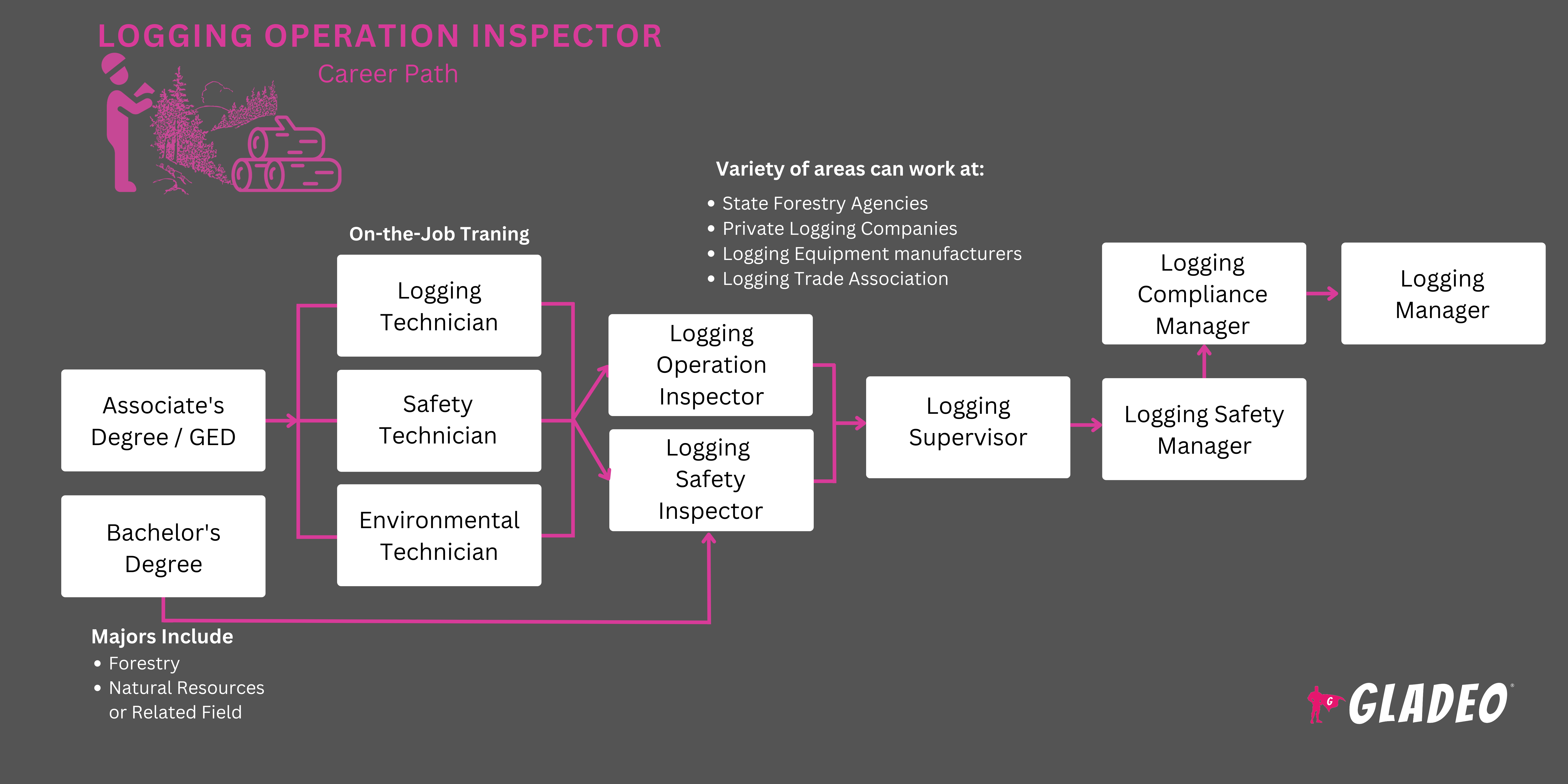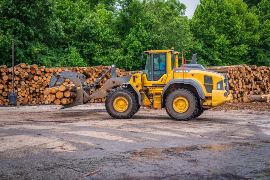스포트라이트
산림 운영 감독관, 벌목 규정 준수 책임자, 산림 규정 준수 검사관, 목재 수확 검사관, 임업 운영 검사관, 산림 자원 검사관, 벌목 규정 준수 전문가, 산림 집행관, 임업 규정 준수 조정자, 천연 자원 검사관
상업용 벌목은 건축, 가구, 종이 및 기타 여러 제품의 원료를 공급하는 데 매우 중요합니다! 하지만 복잡하고 위험하며 지저분한 사업이기도 합니다. 미국 노동통계국의 데이터를 기반으로 한 2022년 Entrepreneur는 벌목을 미국에서 가장 위험한 직업으로 꼽았습니다.
그렇기 때문에 벌목 작업 조사관이 투입되어 현장을 방문하고, 작업 관행을 검토하며, 환경 및 안전 기준에 따라 작업이 수행되고 있는지 확인합니다. 때때로 이들은 정책을 시행하고 벌목 회사가 제대로 일을 하지 않을 경우 책임을 물어야 합니다. 하지만 벌목 작업 조사관의 노력과 성실함은 직원과 계약자의 안전은 물론 지속 가능성을 보장하는 데 필수적입니다!
- 경치 좋은 야외에서 일하기
- 정책 시행을 통한 환경 보호 지원
- 규정 미준수 관행 감소 및 벌목 작업자의 부상 방지 지원
근무 일정
- 벌목 작업 조사관은 풀타임으로 근무하며 성수기에는 초과 근무가 가능합니다. 외딴 시골 지역으로 이동해야 하며 집을 떠나 하룻밤을 묵어야 할 수도 있습니다.
일반적인 의무
- 로깅 작업을 방문하여 계약 조항을 준수하는지 확인하세요.
- 안전 요건 및 규정(근로자의 개인 보호 장비 착용 포함)을 준수하는지 작업 관행을 점검합니다.
- 비상 대응 계획을 포함한 허가 및 안전 프로그램 효과성 평가
- 기계 및 장비를 점검하여 유지 보수 불량 징후와 같은 문제를 찾아보세요.
- 전기톱 및 기타 작업으로 인해 발생하는 대기 질 및 소음 위험 테스트
- 목재 수확 중 수질 보호를 위한 모범 관리 사례 평가
- 연료 및 오일과 같은 유해 액체의 적절한 사용, 보관 및 폐기를 평가합니다.
- 선택적 벌목, 재조림 노력, 토양 침식 완화, 멸종 위기종 서식지 보호 등과 같은 지속가능성 활동을 점검합니다.
- 손상 또는 부적절한 취급으로 인한 사용 가능한 목재 손실을 방지하기 위한 절차를 검토합니다.
- 화재 위험, 해충 번식 및 기타 문제를 방지하기 위해 남은 잔여물(일명 슬래시)을 청소해야 합니다.
- 생산성을 높일 수 있는 추가적인 활용 방법 고려하기
- 조사 결과를 문서화하고 해당 작업 환경의 사진을 찍습니다.
- 현재 기준 및 가이드라인에 따라 검사 등급을 지정하세요.
- 검사, 위반 사항 및 취해진 조치에 대한 기록을 보관합니다. 적절한 기관에 위반 사항 신고
- 위반에 대한 경고 또는 통지 및 시정 지침을 발행합니다. 필요한 경우 운영 중단
- 관리자와 만나 결과를 검토하고, 문제를 논의하고, 필요에 따라 취해야 할 시정 조치의 개요를 작성하세요.
추가 책임
- 입찰 요청을 시작하고 계약 조건을 협상합니다.
- 지역, 주, 연방 벌목 규정은 물론 업계 모범 사례와 기술 개선 사항에 대한 최신 정보를 확인하세요.
- 토양 및 수질 데이터와 같은 환경 영향 데이터 수집
- 직원 및 계약업체와 함께 적시에 건강 및 안전 교육을 실시합니다.
- 기업과 정부 기관 간의 문제 중재
- 법적 절차 중 요청이 있을 경우 증언하기
소프트 스킬
- 책임감
- 세부 사항에주의
- 윤리학
- 무결성
- 규정 준수 지향
- 충돌 해결
- 설득력 있는
- 부지런한
- 연역적 추론
- 이니셔티브
- 지도력
- 관찰력
- 조직
- 끈기
- 문제 해결
- 강력한 의사 소통 기술
기술 능력
- 현장 검사 및 환경 평가 방법, 도구 및 소프트웨어
- 물리적 도구에는 캘리퍼스, 직경 테이프, 증분 보어, 클리노미터, GPS 장치, 나침반, 카메라, 쌍안경, 무전기, 테스트 키트, 소음 측정기 및 안전 장비가 포함될 수 있습니다.
- 소프트웨어에는 매핑, 규정 준수 및 커뮤니케이션을 위한 프로그램과 데이터베이스, 스프레드시트 및 일반 오피스 앱이 포함될 수 있습니다.
- 개별 주 요건에 따른 모범 관리 사례를 포함하여 지역, 주 및 연방 임업 규정 및 법률에 대한 지식
- 응급처치, 심폐소생술, 전기톱, 벌목기, 수확기, 활톱, 크로스컷 톱 및 기타 도구의 안전한 사용을 포함한 벌목 관행 및 안전 절차에 대한 지식
- 벌목 트럭, 스키더, 포워더, 불도저, 굴삭기, 야더, 멀칭기, 가공기에 대한 숙지
- 힘과 체력
- 컨설팅 및 독립 계약업체
- 환경 보호 및 기타 정부 기관
- 국제 조직
- 비영리 단체
- 연구 기관
- 목재 회사
벌목 작업 조사관은 높은 수준의 청렴성과 전문성을 요구받습니다. 벌목 회사가 안전 및 환경 규정을 준수하는지 확인하는 업무를 담당하기 때문에 자주 출장을 가서 현장을 방문해야 합니다.
장거리 운전과 악천후 속 거친 지형을 걸어야 하는 육체적 요구 외에도 복잡한 법률과 지침을 해석하면서 상세한 문서를 유지해야 합니다.
규정을 준수하지 않거나 인기 없는 규정을 시행해야 할 때는 기업과 좋은 관계를 유지하기 위해 외교적 기술을 발휘해야 할 수도 있습니다. 하지만 결국 이들의 임무는 벌목 작업이 가능한 한 환경을 보호하면서 안전하게 작업을 계속할 수 있도록 돕는 것입니다.
벌목 업계의 주요 트렌드는 지속 가능한 임업 관행의 채택이 증가하고 있다는 점입니다. 환경에 대한 우려와 책임감 있게 조달된 목재 제품에 대한 소비자 수요에 힘입어 많은 기업이 산림관리협의회로부터 인증을 획득하고 있습니다. 그 목표는 선택적 벌목 및 재조림과 같은 조치를 통해 목재 추출과 장기적인 산림 건강의 균형을 맞추는 것입니다.
기후 문제와 생물 다양성 손실에 대한 우려로 인해 정부 및 비정부기구의 감시와 규제가 강화되고 있습니다. 조사관들은 벌목 작업이 환경적으로 책임감 있는 방식으로 이루어지도록 하는 임무를 맡고 있습니다. 이는 더 엄격한 규정 준수 조치를 시행하고 지역사회의 참여를 강화하는 것을 의미합니다.
기술 발전은 또 다른 트렌드로, 최신 기계와 소프트웨어는 작업을 더욱 효율적이고 안전하게 만들어 줍니다. 예를 들어, 드론은 항공 현장 조사에 사용되고 있으며 GPS는 벌목 활동을 정밀하게 계획하고 추적하는 데 도움이 됩니다.
벌목 업계에서 일하는 사람이라면 누구나 야외에서 많은 시간을 보내며 자랐을 거예요! 특히 험준한 지형에서 장시간 야외에 머무르려면 많은 체력과 회복력이 필요합니다.
검사관이 되는 사람들은 항상 작은 부분에도 예리한 눈을 가지고 있거나 안전 및 규정 준수 문제에 관심이 많았을 수 있습니다. 이는 어릴 때부터 책임감 있는 직책을 맡았기 때문일 수 있습니다.
- 벌목 작업 검사관은 일반적으로 펠러, 버커 또는 스키더 작업자와 같은 초급 벌목 작업에서 시작하여 감독자, 감독관 또는 관리자로 근무하게 됩니다.
- 이러한 직무에는 고등학교 졸업장 또는 이와 동등한 학력이 필요합니다. 일부 고용주는 임업, 환경 과학 또는 천연 자원 관리와 같은 관련 준학사 학위를 가진 지원자를 선호할 수 있습니다. 학사 학위는 더 높은 초봉을 받는 데 도움이 될 수 있습니다.
- 일반적인 클래스에는 다음이 포함될 수 있습니다:
- 생물학
- 생태학
- 환경 과학
- 임업
- 지리
- 수확
- 수문학
- 천연 자원 관리
- 실비재배
- 토양 과학
- 나무 생물학 및 수상돌기학
- 대부분의 검사관은 회사 절차, 안전 프로토콜, 도구 및 소프트웨어의 올바른 사용법에 대한 실무 교육을 통해 배웁니다.
- 선택 사항인 전문 자격증은 경쟁 우위를 확보할 수 있습니다. 미국 전문 로깅 작업 검사관 협회 (AAPL)는 다음과 같이 자격을 높일 수 있는 자격증을 제공합니다:
- 공인 전문 로깅 작업 검사관
- 등록된 전문 로깅 작업 검사관
- 로깅 작업 검사자 등록
- 일부 주에서는 검사관에게 면허를 요구할 수 있습니다.
- 고용주가 의무화한 안전 교육 과정과 응급 처치 또는 심폐소생술을 이수해야 할 수도 있습니다.
- 로깅 작업 조사관은 출장이 잦기 때문에 일반적으로 유효한 운전 면허증을 소지해야 합니다.
- 벌목 작업 조사관은 반드시 대학 학위가 필요하지 않지만, 학위를 취득하고자 한다면 실무 경험을 쌓을 기회가 있는 프로그램을 찾아보세요.
- 장학금 및 재정 지원 옵션 검토
- 수업료 및 수수료 비용을 비교하여 주 내 비용과 타주 비용에 주목하세요.
- 졸업생을 채용하는 회사와 파트너십을 맺은 프로그램이 있는지 확인하세요!
- 졸업생에 대한 졸업 및 취업 통계 기록하기
- 야외에서 경험을 쌓을 수 있는 과외 활동에 참여하세요.
- 캠핑, 하이킹, 낚시에 참여하세요. 지역 숲을 돕는 자원 봉사
- GPS를 사용하여 야외에서 길을 찾는 방법을 알아보고, 지리 정보 시스템이 매핑에 어떻게 사용되는지 공부하세요.
- 나무 관리와 관련된 야외 일자리에 지원하세요. 흔한 나무 질병 및 해충에 대해 알아보기
- 정부 기관, 민간 임업 회사, 보존 단체 또는 연구 기관에서 현장 경험을 쌓을 수 있는 기회를 찾아보세요.
- 벌목 작업 조사관은 외딴 지역으로 이동하고 험준한 지형을 걸어 다니려면 체력이 많이 필요하므로 체력을 우선시해야 합니다.
- 고등학교의 주요 과목에는 지리, 농업/임업, 자동차 기계, 비즈니스, 정부, 금융, 영어, 대수, 기하학, 생물학, 환경 과학 등이 있습니다.
- 향후 로깅 작업 검사관은 컴퓨터 프로그램 및 데이터베이스 사용법을 알아야 합니다.
- 벌목 작업자 및 벌목 작업 검사관과 정보 인터뷰를 하세요. 그들의 직업에 대해 물어보고 며칠 동안 미행이 가능한지 알아보세요.
- 로깅 포럼을 읽고 일상적인 문제를 파악하세요.
- 벌목 작업에 도전하기 전에 공원이나 야생동물 보호구역에서 아르바이트를 구해보세요.
- 여름 방학 동안 벌목 교육 프로그램 인턴십을 제공하는 고용주를 찾아보세요.
- 운전면허증 취득

- 벌목 작업 검사관으로 시작하는 것은 아니므로 먼저 초급 벌목 직책이나 인턴십을 찾아보세요. 다양한 직무에 대해 최대한 많이 알아보세요.
- 인디드닷컴, 글래스도어, 커리어빌더, 심플리히어드, 집리크루터 등에서 채용 공고를 확인하세요.
- 채용 공고에서 눈에 띄는 키워드를 포함하도록 지원서를 맞춤 설정하세요.
- 해당 지역의 벌목 작업자나 온라인 포럼(예: 임업 포럼)을 통해 연락하세요. 많은 사람들이 기꺼이 질문에 답변해 줄 것이므로 어떻게 일자리를 구했는지, 어떤 도움이나 조언을 제공할 수 있는지 물어보세요.
- 채용 이벤트에 참석하세요. 많은 연방 및 주 정부 기관이 채용 박람회에 참석하여 즉석에서 채용할 준비가 되어 있습니다. 단정한 옷차림으로 질문하고 성숙한 답변을 할 준비를 하세요.
- 대학 강사나 동료 학생에게 그들이 알고 있는 채용 공고나 인맥에 대해 물어보세요. 네트워킹을 통해 많은 일자리를 찾을 수 있습니다!
- 잠재적인 개인 추천인 목록을 작성하세요. 연락처 정보를 공유할 수 있도록 미리 허락 받기
- 로깅 작업 검사관 업무 관행과 용어를 숙지하세요. 면접에서 비즈니스에 대한 지식을 입증하고 윤리와 높은 기준에 대한 의지를 강조하세요!
- 로거 이력서 샘플과 일반적인 면접 질문을 검토하세요. 친구(또는 학교의 커리어 센터)에게 도움을 요청하여 모의 면접을 진행합니다.
- 면접에 가기 전에 고용주의 웹사이트를 살펴보고 회사 운영에 대해 자세히 알아보세요.
- 탄탄한 지식과 기술 기반을 쌓은 후 리더십과 관리 경험을 쌓을 수 있는 기회를 적극적으로 모색하세요.
- 벌목 산업의 재정적 측면과 위반의 파급 효과에 대한 이해
- 뛰어난 안전을 실천하세요! 벌목 작업은 날카로운 도구, 배기가스, 소음, 파편과 먼지, 습한 날씨, 미끄러운 땅, 떨어지는 나뭇가지, 해충과 야생동물, 연료와 화학물질, 잠재적인 화재 등의 위험으로 인해 위험합니다.
- 로깅은 육체적으로도 힘든 작업이므로 좋은 컨디션을 유지하세요.
- 상사에게 추가 책임에 대한 자격을 얻고 싶다고 말하세요.
- 전문 자격증이나 학위가 필요한 경우 수업을 수강하세요. 회사에서 비용을 지불하는지 문의하세요.
- 정시에 출근하고 도구, 장비, 차량 관리하기
- 팀의 일원으로 안전 프로토콜을 준수하고, 편법을 사용하지 않으며, 사고를 방지하는 방식으로 효과적으로 작업하세요.
- 문제를 예측하고, 적응력을 유지하며, 긴급한 상황에 대비한 비상 계획을 세우세요.
- 최고 수준의 청렴성을 유지하세요. 상사가 알아차릴 것입니다!
- 신입 직원을 철저하게 교육하세요. 높은 기준을 설정하여 올바른 업무 수행 방법을 배우도록 합니다.
- OSHA 로깅 표준과 같은 정책 및 규정을 읽어보세요. 성과를 개선하고 사고를 줄이는 트렌드에 대한 최신 정보를 확인하세요.
- 미국 전문 벌목 작업 검사관 협회와 같은 전문 단체에 참여하세요.
- 업계 내에서 강력한 관계를 구축하세요. 이벤트에 참석하여 소중한 인맥 쌓기
- 성과, 책임, 기여도를 추적하세요. 성과 검토 중 공유
- 고용주에 대한 충성심을 유지하세요. 장기적인 헌신은 종종 보상을 받습니다!
웹사이트
- 미국 전문 벌목 작업 검사관 협회
- 미국 로거 위원회
- 아보리스트 사이트
- 현재 임업 보고서
- 환경 보호국
- 산림 자원 협회
- 숲 관리인 길드
- 산림 관리 위원회
- 산림학 저널
- 전국 산림 소유자 연합
- 천연 자원 보호 위원회
- OSHA 로깅 작업
- 범위 관리 협회
- 임업 포럼
- 트리 하우스 - 로깅 포럼
- 목재 수확 웹사이트
- 미국 산림청
- 세계 야생동물 기금
책
- 오지에서 이사회실까지: 팀버랜드에 대한 기관 투자의 증가, 다오웨이 장의 글
- Haywire: 메인주 벌목 숲의 불화와 한 산업의 해체, 앤드류 이건의 글
- 현대 벌목: 나무 벌목, 올바른 도구 사용, 필수 안전 기술 준수, 작성자: Len McDougall
벌목 작업 검사관이 되기 위해 필요한 자격을 갖추려면 몇 년이 걸릴 수 있습니다. 일단 자격증을 취득하고 나면 업무가 길고 힘들며 때로는 단조로울 수 있습니다. 매일매일 새로운 도전이 기다리고 있습니다.
관련 커리어 분야가 궁금하다면 아래의 몇 가지 옵션을 고려해 보세요:
- 농업 및 식품 과학자
- 어메니티 원예사
- 보존 과학자 및 산림 관리인
- 건설 장비 운영자
- 환경 과학자
- 소방수
- 포레스트 레인저
- 실크 컬러리스트
- 야생 지대 소방관
- 야생동물 생물학자
- 동물학자
뉴스 피드

주요 채용 정보

온라인 과정 및 도구

연봉 기대치
New workers start around $43K. Median pay is $62K per year. Highly experienced workers can earn around $94K.






